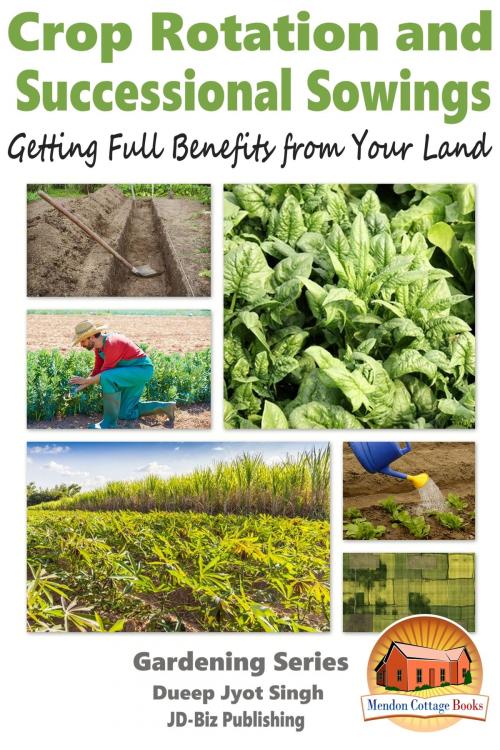Crop Rotation and Successional Sowings: Getting Full Benefits from Your Land
Nonfiction, Home & Garden, Gardening, Techniques| Author: | Dueep Jyot Singh | ISBN: | 9781311988614 |
| Publisher: | Mendon Cottage Books | Publication: | November 25, 2015 |
| Imprint: | Smashwords Edition | Language: | English |
| Author: | Dueep Jyot Singh |
| ISBN: | 9781311988614 |
| Publisher: | Mendon Cottage Books |
| Publication: | November 25, 2015 |
| Imprint: | Smashwords Edition |
| Language: | English |
Table of Contents
Introduction
What Is Rotation
Addition of Lime
Three Crops Rotation
Knowing More about Successional Sowings
Lettuces and Broad Beans
Cauliflowers and Cucumbers
Peas and potatoes
Spinach and French beans
Potatoes spring cabbage, broad beans and Lettuce
Broad Beans and Potatoes
Shallots and Broad Beans
Growing Catch Crops in Trenches
Conclusion
Author Bio
Publisher
Introduction
Since ancient times, man has been growing different types of crops, on the same plot of land, so that the essential nutrients in the soil do not get depleted. The same crop is not grown again after it has been harvested. Man took millenniums to understand the fact that the soil also has a need for essential nutrition, which is going to be reduced slowly and steadily, if one particular crop is going to be grown again and again on that same patch of land.
This book is going to tell you how you can gain a lot of benefit through judicial crop rotation. Since ancient times, human beings have known all about the importance of rotating their crops. That is because they have all seen through bitter experience, that a land which is going to get the exact same treatment year after year is going to get less fertile, and is going to deteriorate unless that treatment is ideal. An ideal treatment outside the laboratory is not possible.
That is because we do not have the time or the manure or the proper climate, or atmosphere or even the desire to give the perfect treatment to our vegetable garden every season. Nor is it necessary.
When you are thinking about crop rotation, you have to remember that it is not only your vegetables that you are going to rotate but also the manures, the cultivation processes, the fertilizers, and also the pest and disease control. The cultivation method and time, which you utilize when you are growing members of the cabbage family are not going to be the same as when you are going to grow, legumes, peas, and beans.
That is why many gardeners are going to tell you that rotation not only saves time, saves money and saves labor, but it also ensures that the area which has been cultivated is going to get different types of treatments, over a 3 to 4-year-old period, depending on whether you are 4 plots or 3 plots which you intend to cultivate
Table of Contents
Introduction
What Is Rotation
Addition of Lime
Three Crops Rotation
Knowing More about Successional Sowings
Lettuces and Broad Beans
Cauliflowers and Cucumbers
Peas and potatoes
Spinach and French beans
Potatoes spring cabbage, broad beans and Lettuce
Broad Beans and Potatoes
Shallots and Broad Beans
Growing Catch Crops in Trenches
Conclusion
Author Bio
Publisher
Introduction
Since ancient times, man has been growing different types of crops, on the same plot of land, so that the essential nutrients in the soil do not get depleted. The same crop is not grown again after it has been harvested. Man took millenniums to understand the fact that the soil also has a need for essential nutrition, which is going to be reduced slowly and steadily, if one particular crop is going to be grown again and again on that same patch of land.
This book is going to tell you how you can gain a lot of benefit through judicial crop rotation. Since ancient times, human beings have known all about the importance of rotating their crops. That is because they have all seen through bitter experience, that a land which is going to get the exact same treatment year after year is going to get less fertile, and is going to deteriorate unless that treatment is ideal. An ideal treatment outside the laboratory is not possible.
That is because we do not have the time or the manure or the proper climate, or atmosphere or even the desire to give the perfect treatment to our vegetable garden every season. Nor is it necessary.
When you are thinking about crop rotation, you have to remember that it is not only your vegetables that you are going to rotate but also the manures, the cultivation processes, the fertilizers, and also the pest and disease control. The cultivation method and time, which you utilize when you are growing members of the cabbage family are not going to be the same as when you are going to grow, legumes, peas, and beans.
That is why many gardeners are going to tell you that rotation not only saves time, saves money and saves labor, but it also ensures that the area which has been cultivated is going to get different types of treatments, over a 3 to 4-year-old period, depending on whether you are 4 plots or 3 plots which you intend to cultivate















